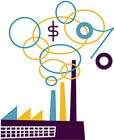Two years after a previous measure in Australia to create a cap and trade system there failed, prime minister Julia Gillard announced a new program that will tax carbon emissions on the country's 500 largest emitters.
The program will begin as a direct carbon tax of $23 per metric ton in Australian dollars (about $25 US dollars) on carbon emissions starting in mid-2012 and rising 2.5% annually through 2015, after which it will switch over to a cap and trade program. That translates, for example, into added costs of about $2.00 to a purchased ton of coal.
Most observers believe carbon taxes are a far more effective and efficient method of controlling CO2 emissions, versus the complex and indirect approach taken with most cap and trade schemes that are also subject to much political manipulation. But that is where Australia will head by 2016.
The tax is set to begin on the select companies on July 1, 2012.
“By 2020 our carbon price will take 160 million tons of pollution out of the atmosphere every year,” said Gillard. “That’s the equivalent of taking 45 million cars off the road.”
The government will exempt farmers, small business, families and , notably, road transport from the scheme initially, though everyone will feel the effects of higher gas, food and other prices. There will be a tax on heavy trucks starting in 2014.
David Simon from the Australian Trucking Association said that the impact on the trucking industry, including cancellation of fuel tax credits, would total $510 million per year by 2014-15. Airline Qantas says that the new rules will increase its costs $115-$130 million annually and that it would be recoup those costs with higher fares.
One think tank predicts that the rules will raise prices overall in Australia by 0.7%, an estimate that “sounds about right to me," said economist Warwick McKibbin, a professor at Australian National University in Canberra.
Brickworks Ltd. said it expects brick prices may rise as much as 6%, according to a statement the company sent to the Australian stock exchange after the news was announced.
The plan will generate some $25 billion in revenues annually, according to estimates, all of which will be "returned to the community," as which many tax experts have said are key to success and fairness in such programs. but how this will happen isn't clear yet. Some of the tax money will go to a new agency designed to promote development of renewable energy technologies.
 Some money will also go to Australian households, especially those with lower incomes, to reduce the impact of the increase in costs for most items. Also in the proposal are cash flows back to steelmakers, coal mines, electricity generators and others to help them recoup some of the higher operating costs. For example, mining giant BHP Bilton would get back some $1.2 billion back under the program to offset the taxes that would be levied on its coal production. Some money will also go to Australian households, especially those with lower incomes, to reduce the impact of the increase in costs for most items. Also in the proposal are cash flows back to steelmakers, coal mines, electricity generators and others to help them recoup some of the higher operating costs. For example, mining giant BHP Bilton would get back some $1.2 billion back under the program to offset the taxes that would be levied on its coal production.
But a spokesman for miner Rio Tinto said the company was ''disappointed'' by a carbon plan that would ''hinder investment and jobs growth without reducing global carbon emissions," adding that it didn't do enough to protect Australia's exports from rising prices.
Steel maker OneSteel said that while it would in fact seek to reduce its use of coking coal in its manufacturing process because of the plan, the steel sector was technologically constrained in its ability to reduce carbon emissions overall.
Many others are also worried the move will reduce Australia's global competiveness or reduce the country's economic growth, saying the government should wait until other countries move to price carbon.
The conservative opposition leader Tony Abbott said that a “unilateral carbon tax” would be an act of “economic self-harm.”
''The precise incidence and impact on the economy is difficult to assess with confidence,'' said Stephen Roberts, chief economist of Nomura Australia.
Some in Australia are also complaining of a growing bureaucracy that will be needed to enforce and manage the measure. One agency has already bulked up to more than 400 staffers in anticipation of the move, with plans to add hundreds more, and other new agencies are being planned.
At this point, just one thing is clear: the world will be watching the Australian experiment to see how it succeeds or not and just what the impact on Australian's economy will really be.
What do you think of Australia's plan for a carbon tax? Smart move - or economic suicide? Let us know your thoughts at the Feedback button below.

TheGreenSupplyChain.com is now Twittering! Follow us at www.twitter.com/greenscm |